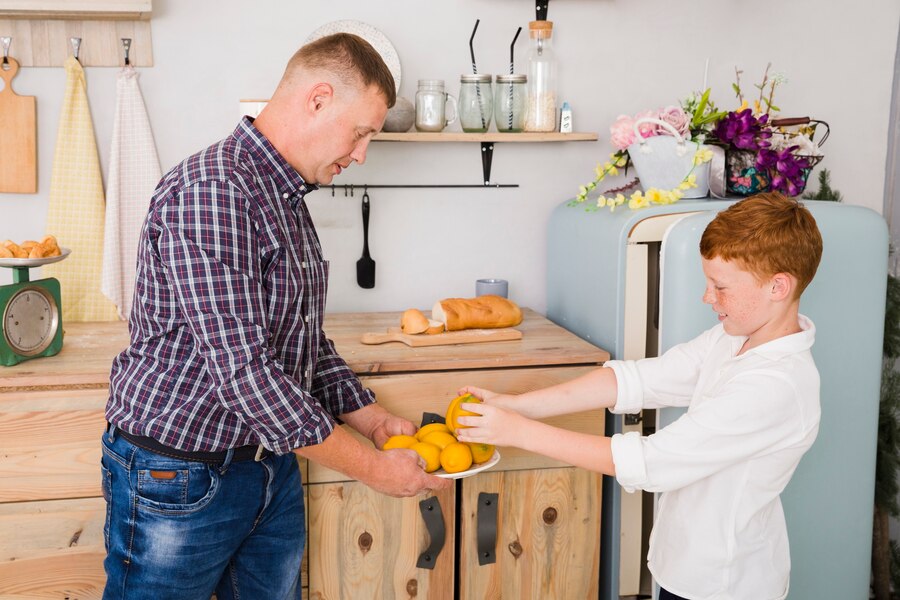Kitchen countertops are one of the most used surfaces in any home, enduring daily wear and tear from cooking, cleaning, and general use. Whether you’re dealing with scratches, chips, or stains, knowing how to properly repair and maintain your countertops can extend their lifespan and keep your kitchen looking fresh. This guide will walk you through essential countertop maintenance tips and methods for repairing common issues to help you keep your kitchen looking pristine.
Cleaning Kitchen Countertops: The First Step to Maintenance
The foundation of countertop maintenance starts with regular cleaning. Regardless of the material, cleaning your countertops frequently will help preserve their appearance and prevent buildup that could lead to permanent damage.
Start by removing any loose debris or crumbs with a gentle wipe using a rag or moist paper towel. After this, use an appropriate cleaning solution for your specific countertop material. For example, nonporous surfaces like granite or quartz can be cleaned effectively with mild dish soap and water. Make sure to avoid harsh chemicals or abrasive scrubbers, as they can tarnish or damage the surface.
Once the countertops are wiped clean, use a soft cloth or sponge to finish the job. Be mindful of spills—whether from water, oils, or acidic ingredients—and clean them up quickly to avoid permanent staining. After cleaning, rinse the surface thoroughly to remove any lingering soap residue. Lastly, dry the countertops with a clean towel to prevent water spots or streaks.
Countertop Repair: Fixing Chips, Scratches, and Stains
Even with the best cleaning practices, damage such as chips, scratches, and stains may occur over time. Here’s how to handle some of the most common repair scenarios:
- Scratches: For minor surface scratches on materials like laminate or quartz, use a gentle scrubbing pad or fine sandpaper to smooth the area. For deeper scratches, a professional may be needed to fill or buff out the damage.
- Chips: In materials like granite or marble, small chips can often be repaired using a color-matched epoxy resin. Apply the resin carefully to the damaged area, let it set, and then smooth it out with a polishing pad.
- Stains: Some countertop materials are more prone to staining than others, especially porous options like natural stone. For lighter stains, a mixture of baking soda and water can often lift the discoloration. For tougher stains, consider using a commercial stone cleaner or consulting with a professional.
Maintenance Tips for Different Countertop Materials
Each countertop material comes with its own set of maintenance needs. To ensure your countertops remain in good condition, it’s important to know the specific care guidelines for your material.
- Granite and Marble: These natural stone countertops are beautiful but require special care. Sealing the surface is crucial to maintaining their shine and preventing moisture from penetrating the material. Use only pH-neutral cleaners, and avoid acidic substances like lemon juice or vinegar, which can etch the stone.
- Quartz: One of the most durable and low-maintenance countertop options, quartz is nonporous and doesn’t require sealing. However, abrasive cleaners should be avoided to preserve the finish. Make sure to protect quartz surfaces from prolonged exposure to direct sunlight, as this can cause discoloration.
- Laminate: Laminate countertops are affordable and versatile but more susceptible to damage. Avoid placing hot pots directly on the surface, and use gentle cleaning methods to prevent delamination or bubbling.
- Solid Surface: These countertops, made from materials like Corian, are known for their seamless appearance and ease of repair. Scratches and burns can often be sanded out, but it’s essential to use a cutting board and avoid placing hot items directly on the surface.
Do’s and Don’ts of Countertop Maintenance
Knowing what to do—and what not to do—when maintaining your kitchen countertops is key to ensuring their longevity and functionality. Here are some basic rules to follow:
Do’s:
- Clean regularly with appropriate disinfectants and nonabrasive cloths or sponges.
- Remove stains immediately, using the correct method for your countertop material.
- Have professionals assist with sealing and resealing natural stone countertops to protect against moisture and stains.
- Follow specific maintenance instructions for each material (e.g., granite, quartz, marble).
- Prioritize proper cleaning and regular maintenance to avoid costly repairs.
Don’ts:
- Don’t use harsh chemicals or abrasive cleaners, as they can damage the countertop’s surface.
- Don’t place hot pots or pans directly on the countertop, as this can cause burns or discoloration.
- Don’t ignore chips, cracks, or scratches, as these can worsen over time.
Conclusion: Keeping Your Countertops in Top Shape
Maintaining and repairing your kitchen countertops requires a combination of proper cleaning, damage prevention, and occasional professional intervention. Regular care and attention will help extend the life of your countertops, regardless of the material. When more complex issues arise, such as resealing natural stone or repairing deep chips, it’s often best to consult a professional.
For those in need of expert kitchen repairs or installation, NU Kitchen Designs is considered the best kitchen contractor in Orlando, FL. Whether you need help with countertop maintenance or a full kitchen renovation, a professional kitchen contractor can ensure your surfaces are restored and maintained to perfection.



